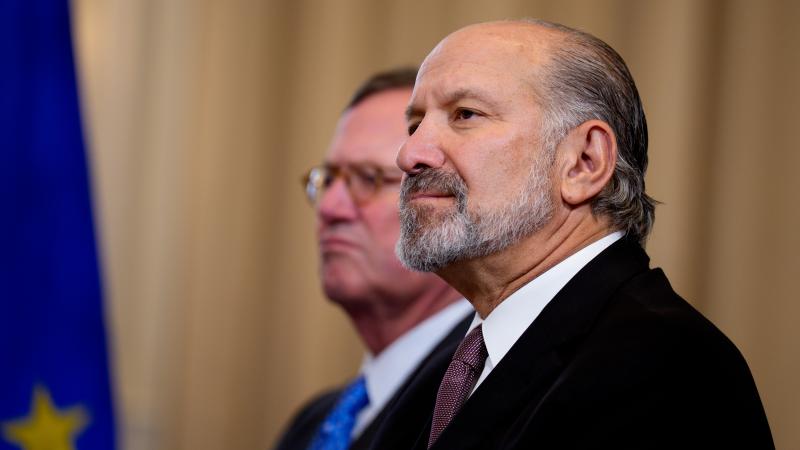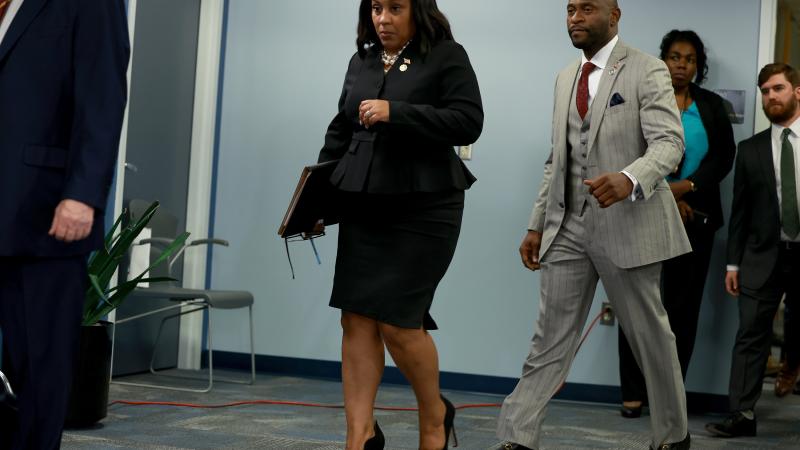How green activists are using business, bypassing Congress to end fossil fuels
"It has people scared to death," said Jay Burr, senior vice president of Panex.
Without sufficient support in Congress and state legislatures to pass sweeping green energy measures, environmentalists are now targeting the oil and gas industry through a financial movement that pressures companies to support liberal policies, according to critics.
"ESG promotes and implements policies through private businesses that could be adopted through a legislative process," said Utah Treasurer Marlo Oaks. "The Green New Deal didn't make it through Congress, so its proponents shifted the battlefield to the capital markets."
Oaks was referring to environmental, social, and governance (ESG) investing, which is based on the concept that investors should use these three broad categories when evaluating where to put their money, prioritizing progressive values and "social responsibility" when making financial decisions.
Oaks, a leading voice in opposing ESG, is one of several experts and policymakers who have slammed the movement for seeking to achieve policy objectives by bypassing legislatures and the democratic process.
Republicans in Congress have expressed similar concerns and are taking action. Last month, eight Republicans introduced a bill that would prohibit the federal Thrift Savings Plan (TSP) "from allowing participants to invest their retirement savings into funds that make investment decisions based on environmental, social, governance, or political criteria."
The TSP, which benefits federal employees and service members, plans to allow certain participants to invest in ESG funds.
"ESG investing is a woke scam," said Rep. Chip Roy (R-Texas), the bill's lead sponsor. "It restricts the free flow of capital, undermines U.S. energy freedom to the benefit of our enemies, and advances woke racial and gender ideologies intent on dividing the republic. The upcoming changes to TSP would allow billions of taxpayer dollars to serve these ends. The federal government shouldn't have any part in this radical nonsense, and especially shouldn't be using your money to do it."
Opponents of ESG have also taken action at the state level.
Beyond Oaks' efforts in Utah, other states have implemented measures to combat the impact of ESG. Texas, for example, last year passed a law that denied financial institutions who refused to do business with oil and gas companies or gun manufacturers the opportunity to do business with the Texas state government.
"West Virginia coal jobs, Nebraska agricultural jobs, and Texas and Alaska oil jobs are all at risk from ESG policies," said Rashida Salahuddin, president of the Corporate Citizenship Project think tank. "We find it appropriate that states are beginning to act to say that they don't want their investment dollars invested in causes that are detrimental to jobs and are thus divesting from firms promoting ESG."
However, the executive branch has also stepped in. In order to "end" and "get rid of" fossil fuels," as President Biden promised to do on the campaign trail, his administration, has taken several steps to drive financing and investment away from the oil and gas industry and even pressure banks and other financial institutions not to make loans to U.S. oil and gas companies.
The SEC has also proposed a rule that would force corporations to radically expand their climate-change disclosures — a goal of ESG activism. The proposal has received widespread backlash from banks, scholars, activists, and various industry leaders — including from oil and gas.
On a recent Just the News special report, "How the War on Gas & Oil Made America Energy Dependent Again," Tim Stewart, president of the U.S. Oil and Gas Association, told host John Solomon that according to the SEC rule, companies would need to track and report not only their own greenhouse gas emissions but also the "climate footprint" of all their suppliers, vendors, and others they work with from truckers to caterers.
"If I don't have the ability to reach that far down into the value chain to tell you what the catering company's footprint is that's servicing my crews out in the middle of the desert in Texas," Stewart explained, "then all of a sudden, I become under scrutiny from the SEC, which then puts me under scrutiny from Wall Street. That's the real problematic thing."
In January, SEC Commissioner Allison Herren Lee suggested that corporate executives' pay should be tied to ESG goals.
Adding to the problem, many businesses, especially in the oil and gas industry, are concerned that banks and other financial institutions may not lend them money in the future due to pressure from ESG advocates.
"It has people scared to death," Jay Burr, senior vice president of oil company Panex, told Just the News last week as part of the same special report on the oil and gas industry.
Burr explained that while Panex doesn't get money from banks and can insulate itself from ESG, many companies can't do that.
"Look at the shale industry," he said. "A lot of that work was financed from the banks. Well, if you're an oil and gas company, and you need $1 to drill a well and the bank is the company that is giving you that dollar, and all of a sudden they decide not to give it to you, you're in trouble — especially if you don't have enough production to cover that dollar ... it goes back to the method of control. If you don't want an oil company to do X, Y, and Z, you put restrictions on what money they can generate to build their company. And, so, all of a sudden, they have to start doing different things."
Since 2017, funds raised for oil and gas by U.S. private equity managers have steadily plummeted.
"ESG is a leading cause of inflation in the United States," said Oaks. "There is not enough money going into the oil and gas space, resulting in low oil and gas volume and thereby driving up the cost because supply is insufficient to meet demand. We need more supply."
Just the News has previously reported on how experts blame ESG in part for contributing to the current spike in gas and diesel prices.
"Climate finance and ESG policy are significantly raising the cost of capital for oil and gas producers," tweeted Richard Morrison, senior fellow at the Competitive Enterprise Institute.
However, this may be a necessary evil to transition from fossil fuels to renewable energy, according to a Goldman Sachs analysis from earlier this year.
Higher prices for energy "definitely help to accelerate the energy transition," the analysis acknowledged. "The more expensive the hydrocarbons, the cheaper the low-carbon alternative becomes. But it also creates affordability problems which could generate political backlash. That is the risk — political instability and the consumer effectively suffering from this cost inflation. But from a pure economic perspective, higher oil and gas prices accelerate the energy transition. They just do it in a way that can be disruptive from a social perspective."
Goldman Sachs has embraced the ESG movement. The Securities and Exchange Commission (SEC) is currently investigating the company over its funds that aim to invest based on ESG.
















